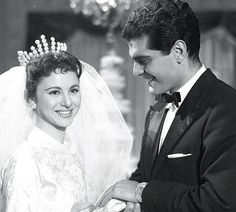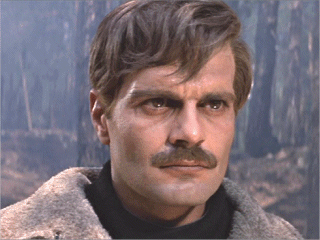 Omar Sharif and Faten Hamama
Omar Sharif and Faten Hamama
Faten Hamama (1931 – January 2015) married Omar Sharif (1932 – July 2015) in 1955 and the two became one of the classic romantic couples of Egyptian cinema, appearing again in Ayyamine el helwa (1955) (“Our Best Days”), Sayedat el kasr (1959) (“Lady of the Castle”), La anam (1958) (“Sleepless”) and Siraa Fil-Wadi (1954) (“Struggle in the Valley”). Sharif and Faten divorced on 1974. He made what became a famous statement about Faten that he only married once because he only loved once, and that was Faten.
The last phone call
Before Faten Hamama dies, Omar el Sharif did a last phone call through a friend who surprised him by saying: Let’s call Faten. 20 years passed since he talked to her.
Last production
In 2005 Omar Sharif played Imperium: Saint Peter about the life and work of Saint Peter. The film stars Omar Sharif as Peter, and was originally released as San Pietro. In 2010 he played an Egyptian movie Al musafer, the traveler. Movie link.
Movie of the day: Hassan and Marcus
In 2008, Omar Sharif played the movie “Hassan and Marcus” with the Egyptian star Adel Imam.
The movie
When the lives of Mahmoud, a Muslim Sheikh (Omar Sharif) and Boulos, a Christian Priest (Adel Emam) are threatened by religious extremists on both sides, the Egyptian government inducts them into a witness protection program that requires them to disguise themselves as the Christian, Marcus Abdel-Shahid, and a Muslim Sheikh, Hassan el-Attar, respectively. When, unwittingly, they move into the same building, a friendship blossoms that must, along with a romance between the protagonists’ children, withstand the difficulties of prejudice and social persecution. Hassan and Morcos don’t attempt to name the reasons for the tension between Christians and Muslims but, according to the political writer and Coptic Christian Sameh Fawzi, the conflicts have nothing to do with religion.
Background
Being the first collaboration between Adel Emam and Omar Sharif, arguably the most prominent actors in Egypt and the Middle East, the movie was a much-anticipated summer blockbuster. However, its message proved so controversial that Facebook groups sporting Adel Emam’s picture in Coptic garb called for a boycott of his movies, and the resulting emotional distress is reported to have prompted Imam to move from his home in Cairo to a summer house in Porto Marina, a resort on Egypt’s northern coast. Imam, Sharif and other collaborators on the film have vehemently defended its content and criticised many conservatives and religious extremists who consider it blasphemous.
Themes
The film addresses issues of religious extremism, intolerance and sectarian violence, and emphasises the possibility of friendship and love between members of different religions.
Imam said of the film:
“I have declared war using art against the extremists – against those who foment differences between us. I hope Christians and Muslims will leave the cinema and embrace one another.”
Criticism
Muslim movie star Adel Imam was accused of apostasy by Facebook activists over his role as a Coptic Christian  priest in the film. The group accused him of promoting Christianity and discouraged Muslims from seeing the film. The group’s mission statement read “This man is promoting conversion to Christianity and I am calling upon you to boycott him.” Another group was also created for the same purpose under the title “Boycott Imam’s new movie.” The criticism of Imam occurred during a tense period marked by violent clashes between Muslims and Coptic Christians in Egypt.
priest in the film. The group accused him of promoting Christianity and discouraged Muslims from seeing the film. The group’s mission statement read “This man is promoting conversion to Christianity and I am calling upon you to boycott him.” Another group was also created for the same purpose under the title “Boycott Imam’s new movie.” The criticism of Imam occurred during a tense period marked by violent clashes between Muslims and Coptic Christians in Egypt.
Paul Attallah



